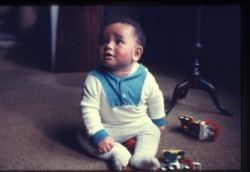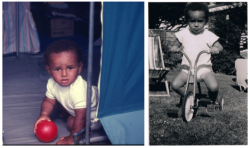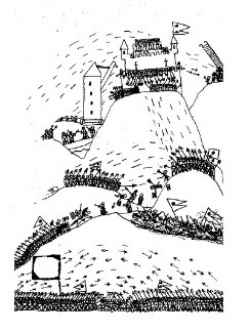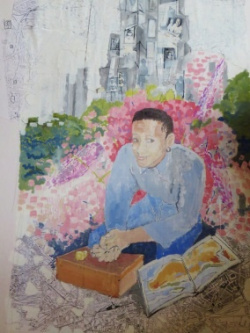A loss you can't imagine: young men and suicide

1992. Only a few weeks after his twenty-first birthday, our son David died in a fall from the top floor of a high-rise block of flats behind the Merrion Centre in Leeds. I see it from the motorway every time I drive to Leeds .
Suicide prevention remains a universal challenge. Every year, suicide is among the top 20 leading causes of death globally for people of all ages. It is responsible for over 800,000 deaths, which equates to one suicide every 40 seconds.
Every life lost represents someone’s partner, child, parent, friend or colleague. For each suicide approximately 135 people suffer intense grief or are otherwise affected. This amounts to 108 million people per year who are profoundly impacted by suicidal behaviour. Suicidal behaviour includes suicide, and also encompasses suicidal ideation and suicide attempts. For every suicide, 25 people make a suicide attempt and many more have serious thoughts of suicide.
September 10 was World Suicide Prevention Day. Anything anyone can do to raise awareness of the waste of life and the damage it does to friends and families, and to teach us how we can better look out for and look after those we love is timely.
For over 20 years I’ve wondered if I should have seen anything that would have told me how desperate our 21-year-old son was when he took his own life. The sense that I bear a responsibility for it will never leave me, or his mother, his sister, his brothers. All I can do is share the story.
Just over five years ago, two people I love found their son dead in their living room. He was about the same age as mine was when he killed himself. I remember I wrote to them and said something like: People will tell you they can imagine what you’re going through. They are wrong. More thoughtful people will tell you they can’t imagine what you’re going through. They are nearly right. The fact is, you can’t imagine what you’re going through.
Three good friends of mine, all the same age as me or thereabouts, have died in the last 18 months. Two, apparently fighting fit and well, died of sudden catastrophic heart attacks. One died after a long and painful illness. We grieve for them, but we understand our grief. Their deaths are sad, they diminish us, but we understand this natural process. It doesn’t accuse us. But when someone you love takes his own life, when it comes without warning, it’s inexplicable, bewildering, devastating. It makes no sense. The world makes no sense. You are made helpless with guilt; you believe you are to blame, that you could have prevented it if only …
This happens to tens of thousands of people every year. The statistics are terrifying. The websites you can visit will tell you:
Suicide is the single biggest killer of men aged under 45 in the UK. In 2015, 75% of all UK suicides were male.
Men and boys are often more vulnerable to taking their own lives because:
- They feel a pressure to be a winner and can more easily feel like the opposite.
- They feel a pressure to look strong and feel ashamed of showing any signs of weakness.
- They feel a pressure to appear in control of themselves and their lives at all times.
Most suicidal people don’t actually want to die, they just want to remove themselves from an unbearable situation, and for the pain to stop.
There’s a lot of support and advice available for people who are worried that someone they know may be a suicide risk. Advice like this:
So how will you know?
You ask. It sounds scary, but the best thing to do is talk about it.
Saying something is safer than saying nothing. Trust your gut and start the conversation
What to say
Not too much. Above all, LISTEN
For me, and for my family, it was all too late. Because we had no idea, because there was no warning sign we could pick up on. There was just the immutable fact that our David had killed himself. We are tight as a family, we comforted each other, but we go on living with the bewilderment and loss and overwhelming guilt. It never quite goes away. So I’ll dedicate this post to all the families who have lost a child, a sibling, a parent, a partner to suicide, and I’ll talk about the long, long process of finding the serenity to accept what cannot be changed. I’ll tell you our David’s story.
Two of my five children were adopted, and our David was one of them. Against all the rules, we met his birth mother, who would have been no more than 18. She wanted a say in who would adopt him, and a wise social worker thought she had that right. That young girl trusted him to a couple not that much older than her. She will be in her 60s, now.

It’s a complicated story, but the core of it is that we were at yet another stage of the usually ponderous adoption process, which suddenly accelerated quite wonderfully and frighteningly, and we found ourselves sitting in the small living room of a foster mum, and our David, who wasn’t yet Our David, four months old and surrounded by love, was having his bath. He wasn’t called David, either. He was Conrad Hamilton Gervaise Irving (no surname), and just Conrad, for convenience. When you adopt a child you’re not supposed to keep his or her given names. Since the truth is that the amazing and enlightened social worker short-circuited every due process that evening, and that we drove home up the M1 with Our David in a carry-cot on the backseat of a Ford Anglia, it didn’t seem so transgressive to keep Conrad as his middle name. David Conrad Foggin.
This much
I remember:
the small neat creases, the crook of each elbow,
the crook of each knee, the soft place
between your neck and your shoulder,
and the tight whorls of dark hair
tattooing your skull, and the delight,
the wide pink of your open mouth
as you came shedding light and bright water
out of your bath, how you sank
in the fleece of a fat white towel,
and you lay on your back on her knee
and you danced,
how you pedalled and trod on the air,
and how pale the soles of your feet.
You were mangoes, grapes, you were apricots,
all your round warm limbs, your eyes.
How your name made you smile;
how we said it over and over, your name;
how we wanted to make that smile.
And I remember
how we would take you away,
and why your name could not come,
why we must leave it behind,
and how we feared for your smile.

Later, when he was nine or ten years old, he drew endlessly; meticulous battle scenes, sometimes on rolls of lining paper, so they stretched out like eclectic Bayeux tapestries. I wrote a poem about them, years ago, and keep revisiting it, and rewriting it.

Our David’s Pictures
In tracing the anatomy of war
our David’s concentration’s absolute.
He kneels in peace, head bowed. An acolyte.
His pictures conjure tiny armies on the floor.
All history’s invited to this fight:
Martello tower, Pele, and launching pad,
heaps of Roman, Norman, Saxon, Panzer dead.
Drawn up, his minute cohorts. Black and white.
Each man’s accoutred – breastplate, chainmail, greaves.
Crusaders squint down Gatling sights,
or brandish spears with blades as big as axes,
and quivers jammed with arrows, bunched in sheaves.
Every shield’s a wicked chevron
or a bossed and studded disc;
the sky is bristling with a stiff cheval de frise
of arrows and everyman’s vulnerable, at risk.
There’s Agincourts of arrows, flight on flight.
The sky’s cross-hatched, and somedays almost black.
The sun’s crossed out. Eclipsed. Our David’s arrows –
they fly miles, out of day and into night,
they shift the whole perspective. What is it
he celebrates? Pattern? Power?
The living or the dead. I’ll never know,
his last bow drawn, and loosed, an age ago.
I wrote this when he was still alive, puzzled and perhaps mildly worried about the obsessive quality of the drawings. But mainly delighted. When he died, I changed the ending, and it was read at his funeral. We had a Bob Marley track in the service. Stop That Train. It was an extraordinary service. There were dozens and dozens of young people who I’d never seen before, who I didn’t know, but who had clearly loved our David. For some reason he either never knew, or if he knew, he didn’t believe it.
It was a long time between being told of his death and his funeral. My wife and I had separated seven years earlier. We weren’t asked to identify his body and I was too numb to wonder why I wasn’t notified of the inquest, and I was too numb to protest.
The morning the police told my ex-wife of a death behind the Merrion Centre, the morning she drove from Leeds to tell me, the morning we went to the police station in Chapeltown was the morning I started to learn about the lovely boy I realised I didn’t really know. That he’d been smoking dope, that this may have triggered a suspected schizophrenia, that some time earlier he’d served a short prison sentence for a trivial non-violent offence, that he was being looked after by Nacro (the National Association for the Care and Resettlement of Offenders), that he was training as a painter and decorator (like his great-granddad). I know I could have known all this, and I should have, but I was too busy, too tied up with a new job, a new relationship, and deep down, because I was scared to ask. Most of those young folk at the funeral were young offenders on schemes like the one our David was apparently enjoying. Nothing made sense.
It was a morning like this
a Sunday morning. The sun shone.
It was July. It was a morning like this,
your ex-wife at the back door,
and why would she tell you
your son was dead, or had died,
or had been in an accident
on a morning like this still
not fully woken, a morning of sun
to drive into Chapeltown to drive
to a police station that’s called
The Old Police Station now, that’s
a bijou gastropub but then was just
a police station full of Sunday morning
sadness, and a morning something
like this and two young coppers
who thought we’d need somewhere
quiet at the back which turned out
to smell of smoke, that had a pool table
and coffee rings, and no-one knew
how to start or what to ask but
it was a morning much like this
they asked if we knew a tower block
behind the Merrion Centre or if
we had a connection to a tower block
and a ring with a skull and a brown
leather case and did we know if
our son had friends in a tower block
behind the Merrion Centre and
we might as well have been asked
about tree rings or chaos theory
or fractals on a July morning and
one young copper saying that
he didn’t think it made sense
for cannabis to be illegal and
what harm did it do really and
how it wasted everybody’s time
and I don’t know why I’d remember
that except it was a morning like this
I learned what waste might mean.

It started with rediscovering Greek myths, and particularly the story of Icarus. It was discovering, through the process of retelling the story, that the character no one pays enough attention to is Daedalus. No one points out that if Daedalus had used his amazing gifts well, he would never have needed to build a labyrinth, would not have given away its secret, would not have been imprisoned in a tower with his son, would never have needed to conceive of making wings. I understood, through this that if you make wings for your children, it’s not enough to just watch them fly. Whether they fly into the sun or the heart of darkness, if they fall, then are you responsible, and how will you live with that?
Tony Harrison wrote that in the silence that surrounds all poetry
‘articulation is the tongue-tied’s fighting’.
I believe articulation is healing, a way to atonement and to being able to forgive yourself. The serenity to accept the things you cannot change. Articulation can be confessional, too. You can’t change the past; ‘what ifs’ and ‘if onlys’ simply make you spiritually ill. We know this, rationally, consciously, but living by it needs help. Two poets have given me that help. Clare Shaw’s credo “I do not believe in silence” and her unwavering frank gaze at her history of self-harm, and psychological disturbance gave me courage. As did Kim Moore’s decision to use poetry to deal with her experience of domestic abuse. And, finally, one moment in a writing class that Kim was running that somehow unlocked suppressed and unarticulated belief, guilt, knowledge. I remember I wept silently all the time I was writing. It only lasted five minutes, that task. But an insight, an acknowledgement takes only a moment no matter how long the process that leads up to it. This thing of darkness I acknowledge mine says Prospero at the end of The Tempest. I think I understand the release he must have felt in that split second.
A weak force
there’s sometimes a loss you can’t imagine;
the lives never lived by your children, or
by the one who simply stopped
in the time it takes
to fall to the ground
from the top of a tower block.
They say gravity is a weak force.
I say the moon will tug a trillion tons
of salt sea from its shore.
I say a mountain range will pull a snowmelt
puddle out of shape.
I say gravity can draw a boy
through a window
and into the air.
There is loss no one can imagine.
In the no time between
falling and not falling
you learned the art of not falling;
beneath you burned
the lights of Sheepscar, Harehills,
Briggate, Vicar Lane;
lights shone in the glass arcades,
on the tiles, on the gantries of tall cranes;
motorway lights trailed ribbons of red,
and you were far beyond falling.
Because you shut your eyes
because you always shut your eyes
you closed them tight as cockleshells
because when you did that the world
would go away the world
would not see you.
I remember how you ran like a dream.
I remember how you laughed when I swore
I would catch you.
Then you flared you went out
you flared like a moth and you blew
away over the lights over the canal
the river the sour moors the cottongrass
the mills of the plain
and over the sea and over the sea
and the bright west
and you sank like the sun.
I count myself lucky. Lucky to have had our son for 21 years. Lucky to have learned to live with the loss of him and to have learned how to make amends to myself and to his memory. Lucky to be able to articulate it.
A year ago we were told we now have a Minister for Suicide. She has no budget, no staff, no office, no brief. A disproportionate number of young men and women will take their own lives in the coming year. Some of them will have been made desperate by being stripped of benefits, being made homeless; some will have been denied the recognition and appropriate treatment they desperately need for their mental health issues. Whatever their circumstances, there will be parents, siblings, partners, children, friends who will be numb, full of unassuageable guilt. There is loss no one can imagine.






Dominic James
Wed 25th Sep 2019 10:56
John, thanks for sharing this, that is the first thought that comes to mind.
I recognise that awful finality in the last act of a despairing life and the aftermath which consumes those left behind. Like many of us - I hadn't realised how many - suicide touches the lives of those around me, and sometimes looms over those closest to me. And the closer the greater the continuing pain. That the pain can be overcome is a warm message to be repeated. And your advice to listen comes at the right time. All credit to you for that.
I weighed up the Icarus story, by the way, my poem shot through with the guilt of Dedalus, re-shaping pride in his successes to figure the loss of a son, that vital part of him. We do what we can for the young: from a distance, I remember then I though time was on my hands, but I was wrong. Life has its term and life is precious.
Dom.